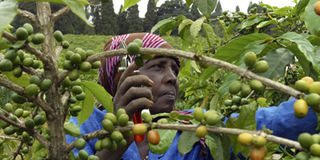Prime
Climate change affecting coffee production

Coffee has for a long time been a major revenue earner but its production is decreasing. FILE PHOTO.
Climate change and inadequate labour are some of the factors that have caused a decline in the production of coffee and cotton, a government official said on Wednesday.
Speaking during a debate on policy dialogue concerning hunger and malnutrition, Mr Henry Bagiire, the state minister for Agriculture, said climatic conditions in Uganda have changed leading to the emergence of pests and diseases that affect crops.
He said: “Many things are no longer the same. Global warming has enabled the growth of many pests and diseases, which have led to a decrease in the production of some crops.
Deadly pests
He added: “Coffee diseases, which used to be preventable, have become deadly, which has as a result reduced the rate of production.”
According to statistics from the Uganda Coffee Development Authority, the production of coffee output and export has declined due to bad weather experienced in 2009.
UCDA, which had earlier in the year forecasted exports of at least 3.05 million bags of coffee in 2009/10, revised the figure downwards to 2.8 million bags.
The June 2010 coffee export declined as the Authority realised exports of only 220,000 bags.
Important cash crop
Since the 1980s, coffee has been one of Uganda’s most important cash crops, with estimates putting its growth at 191,700 hectares of Robusta coffee and about 33,000 hectares for Arabica coffee respectively.
Mr Bagiire said there’s need for farmers to carry-out soil management like spacing and harvesting in time so that crops can withstand pests and diseases.
He said some farmers have deliberately shunned growing coffee and cotton in favour of other fast growing cash crops like Maize and Bananas, which are being exported to South Sudan.
He, however, noted that rice production has increased in recent years and is expected to increase further by 2013.
“This country is not a native rice growing state, this crop was brought in the country by the Chinese but now we are enjoying the crop,” he said adding : “This country needs 200,000 metric tons of rice and we hope that we will be there by 2013, making this country have enough food and even start exporting some.”
The Minister silenced the farmers who were demanding for mechanization of agriculture for high food production when he said that the land in the country is highly fragmented.
“A 50 horse power tractor is supposed to work on about 200 acres of land. The land is currently fragmented and using machines is a problem,” Mr Bagiire said adding that government bought tractors for farmers immediately after NRM took over power but were misused.
He urged the farmers to purchase their own tractors.




